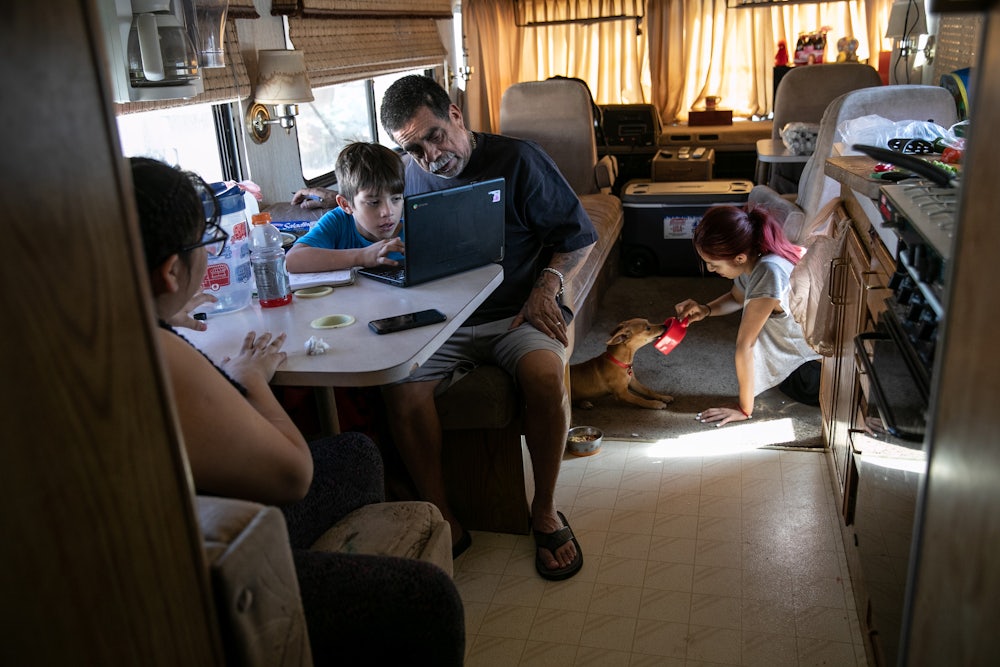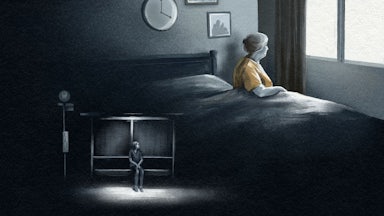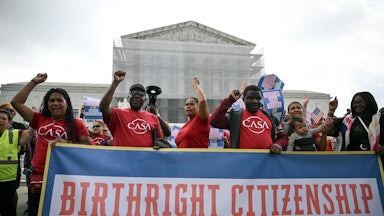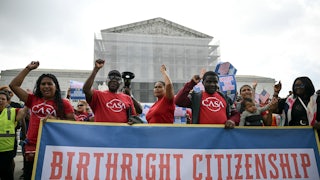The American Families Plan is not utopian, but it could be understood as aspirational. According to reporting from Jeff Stein at The Washington Post, the plan, to be released by the Biden administration this week, moves hundreds of billions of dollars to support paid family leave and childcare, along with extending direct payments to parents (through the most recent stimulus’s reforms to the child tax credit) to 2025, something that has already been welcomed—and opposed—for delinking welfare from work requirements. In a way, the plan is being marketed as making work and home life resemble the fantasy of productive and rewarding labor that both are meant to deliver, though rarely do. It promises to better enable people to work and to build families—using $1.8 billion to underwrite two institutions that also stand in the way of many people’s survival.
Still, while the messaging in support of the plan can sound like an appeal to conservative values about work and family—this is essentially the only narrative defense being put forward, by both Democrats and Republicans—the social and material change the plan might make does not necessarily have to be. As labor and care are currently organized, both frequently fail to meet our needs, let alone expand what’s possible. Their value is so entrenched and naturalized that it can be difficult to ask: What’s wrong with simply paying people who stay home and provide care to children and elders, not because there are no jobs, or no jobs that fit well around the demands of that care, but because it’s the kind of world we want and owe to one another? The pandemic and fatal governmental nonresponse has pushed questions like this to the fore, now that we are in a full-blown crisis of care, one that comes as no surprise to domestic workers and health care workers, to many feminists and parents, and all of the above. There is no way out but to question these failed systems.
“Work and family are so tightly coupled that we may have a hard time disentangling our investments in them,” as Kathi Weeks, professor of gender, sexuality, and feminist studies at Duke University, said in a 2018 interview. They are also inadequate to the task of providing us with resources, care, and meaning. In that sense, they are two sides of the same coin, Weeks argued. “The ascetic ideal of hard work and self-sacrifice for productive ends is echoed in the emotional impoverishment of the family model that presumes to limit and pre-define our relations of intimacy and care.” Where work fails, we’re told to shore up family life for support, and vice versa, a feedback loop that gets in the way of considering a life outside of it.
So it’s also no surprise that, in trying to sell this plan to both conservative Democrats and neofascists in the Republican Party, tradfam notions predominate. It is where a broad political spectrum of work/life rhetoric converges. “Millions of working people want to start a family and would like to care for their children at home, but current policies do not respect these preferences,” Republican Senator Josh Hawley said Monday, announcing his own child tax credit proposal in response to Biden’s still-anticipated plan. Biden’s plan wouldn’t include a work requirement for this benefit; Hawley’s would, as well as paying less to unmarried parents, and where his Republican colleagues diverge, in part, is on how many more people should be excluded. Still, the presumption is shared: Benefits can be used to confer government approval on certain family formations.
That is also a bummer way to say, even the patriarchy has an interest in wages for (some) childcare work. (This investment in keeping certain kinds of families just above water is nothing new.) And yet, this conservatizing strategy doesn’t have to set a limit on what can be demanded, or imagined, in this moment.
Perhaps, then, the American Families Plan could both meaningfully address the care crisis and open up space for more radical demands about work and family life. Speaking in 2018 around gender and demands for universal basic income, Weeks also said, “The only conclusion that I have settled on at this point is that the outcomes will depend in large part on the terms by which the demand is advocated, more particularly, on whether a feminist agenda is forcefully and over time successfully communicated.” Rather than fall back on conservative ideals of the goodness of (say) women staying home to raise children, this would be the time to demand more.
For their part, Democrats in Congress are already calling for more substantive investments in care as part of the American Families Plan. Over the last week, 17 Democratic senators and 83 House members have joined a call to include a Medicare expansion. The Congressional Black Caucus, along with other members of Congress, has asked that under the plan, the expanded child tax credit, which pays direct benefits to parents, be made permanent. Eight Democratic senators and 35 House Democrats want the plan to include $700 billion—more than Biden will reportedly allocate—to get closer to their goal of universal childcare. “The American Families Plan presents an historic opportunity to not only recover from the devastating effects of the pandemic, but also to build a stronger caregiving economy for women and families across the country,” they wrote. How do we want to read that, as reinforcing norms of women as carers or challenging them by recognizing that care is, in fact, worthy of remuneration?
These disjunctures are not new. These moments in which care is recognized as the work that “makes all other work in our country possible,” as the senators’ letter does, can also become a way to put it on a different kind of pedestal. To hear members of Congress use lines like that, which were, 10 years ago, mostly the province of domestic workers’ organizing, or before that, of the Wages for Housework movement, is disorienting. Valuing care as simply the means by which to recognize work’s value is not what that movement was about. Not even the century-earlier eight-hour day movement—eight hours for work, eight hours for rest, and eight hours for what you will—was about that. Utopian demands cannot be and should not be reduced to serve congressional debates over trillion-dollar packages.
Neither can they be set aside. This window is the time to expand on them, to press for universal income that has nothing to do with reproduction, for universal health care untethered from work. This is already happening: In the pandemic, we have seen tenants organizing to expropriate so-called “affordable housing” from landlords who benefit more from the system than they do, migrant and informal workers resisting police harassment and violence by caring for one another, and rejections of workism altogether in favor of reclaiming leisure.
The “crisis of care,” observed the philosopher, feminist, and New School professor Nancy Fraser, predates this moment of “coronavirus in the age of neoliberalism.” The pandemic, she said in 2020, provides us with “a textbook lesson of the absolute imperative for a socialist feminist reorganization of society. It gives new meaning to the idea of disaster capitalism. It’s not that the disaster comes from outside and [capitalism] is not able to deal with it so well. It is the disaster itself.” If there is a window right now in proposals to make life more decent for more people, in which small steps toward such a reorganizing may be politically possible, the goal should be to ensure that window doesn’t become a trap, reinforcing the social order that has made work and family in its limited image.








